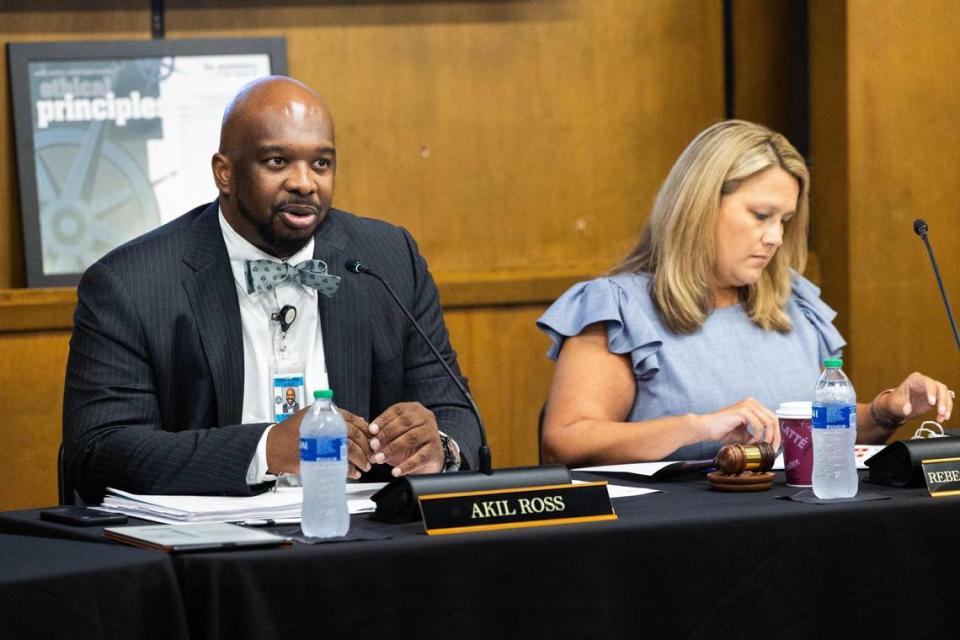Author Ta-Nehisi Coates shows up at SC school board meeting debating his book
- Oops!Something went wrong.Please try again later.
For the second school board meeting in a row, a parade of public speakers sounded off Monday on a controversial English lesson at Chapin High School. But the public’s thoughts this time were almost the polar opposite of the last board meeting.
Monday’s meeting was the second to be dominated by discussion of a lesson plan by Chapin High School English teacher Mary Wood. The lesson on systemic racism, which featured a book by renowned Black author Ta-Nehisi Coates, became controversial when it was shut down this past spring because of concerns it violated state law.
At the previous June 26 meeting of the Lexington-Richland 5 school board, following coverage in The State, several speakers criticized Wood’s lesson plan, with one saying she was “surprised to find this teacher is still employed at Chapin High even though she showed no remorse and strongly defended herself after she broke the law.”
In contrast, a dozen speakers at Monday’s meeting expressed their support for Wood, and decried the public pressure they felt led to the cancellation of last spring’s lesson on Coates’ book.
In February, Wood introduced her advanced placement language arts class at Chapin High School to the memoir “Between the World and Me” by Coates. The award-winning 2015 book recaps American racial history and its impact on his life growing up Black in inner-city Baltimore. The memoir was written in the form of a letter addressed to Coates’ teenaged son.

Wood intended for the book to be used as part of an argumentative essay component of the college-level course.
But some students expressed discomfort with the lesson plan and two short videos played in class: “The Unequal Opportunity Race” and “Systemic Racism Explained.”
School administrators told Wood to drop the book, citing concerns that it violated a state law prohibiting the teaching of divisive racial concepts.
Patrick Funk is a former teacher in the school district who said cases like Wood’s led him to leave. “Until you give full-throated support to teachers, you will continue to hemorrhage them.”
Mallory Greene, 14, is a rising high school student who said she so far had not been assigned a non-white author in school, although she had read Coates’ book.
“He describes America as a galaxy, where idyllic white suburbia was on the other side,” Greene said. “I grew up on that side of the galaxy… and learning his perspective brought me awareness, not shame.”
Tess Pratt, the chair of the English Department at Chapin High, told the board she had approved Wood’s usage of the book and ordered copies, which were used in the previous year’s class without complaint. She said it made teachers’ “hearts grow heavy” to know some people think they’re indoctrinating children.
“I’ve dedicated my entire life to sharing stories, both fiction and nonfiction, with my students,” Pratt said, at times growing emotional. “I’ve shared my stories with them, and asked them to share with me.” When she had to take the copies of Coates’ book back from Wood’s class, “I silenced his story, and I’ll regret that for the rest of my life, because that was wrong.”

Monday’s meeting also featured speakers from the Lexington NAACP and the American Civil Liberties Union of South Carolina, who also spoke in support of teachers’ academic freedom to teach controversial subjects.
Superintendent Akil Ross opened the meeting by laying out Lexington-Richland 5’s policy on academic freedom, saying he was confused by questions of whether the district taught “systemic racism.”
“I haven’t seen a (teaching) standard on racism in South Carolina,” Ross said. “We have standards for critical thinking, debate, argumentative essay, rhetoric.” Race is one of several topics that teachers can use to initiate those discussions, he said.
“These are standards to help children think for themselves,” he said.
Ross said if parents have questions or concerns about what their children are learning, they should first address them with their child’s teacher. “Nine times out of ten that’s where the issue is resolved.”
Ross shared his own story about a lesson his young daughter had learned in school about the invention of the cotton gin, which “improved conditions for workers,” she was told. Ross, who is Black, said his daughter told him her class had learned about “workers, like us,” without the class material mentioning those workers had been enslaved.
“I said, ‘maybe we need a second opinion on this,’” which he said his daughter’s teacher was able to do.
Coates himself was present for Monday’s school board meeting, but did not speak. Neither did Wood, who was also present.

In their discussion, the board members agreed the language in the district’s policy on controversial materials was adequate. Board member Catherine Huddle stressed that the district needed to “follow the law” as spelled out in the state budget.
For the 2022-23 school year, S.C. lawmakers added a proviso to the state budget that prohibited state money from being spent to teach various ideas related to race, including “an individual, by virtue of his race or sex, is inherently racist, sexist or oppressive,” “bears responsibility for actions committed in the past by other members of the same race or sex,” or that “an individual should feel discomfort, guilt, anguish, or any other form of psychological distress on account of his race or sex.”
The motion was passed to combat supposed “critical race theory” in South Carolina schools. Critical race theory is an academic framework for studying how the development of laws and public policy contribute to racial inequity. The theory is normally used in high-level university courses, but critics have applied the term to almost any discussion of race or racism in K12 schools.
Huddle suggested the district needed stricter standards on outside material, noting that lesson plans can now include “videos, websites, all those things” in addition to text, as well as requirements for more even-handed discussion of controversial topics.
Board member Mike Satterfield, a former principal at Chapin High, said the budget proviso was “political” language that is “very vague and sounds pleasing,” but doesn’t include any clear direction on what teachers or school boards are supposed to do to enforce it. “And then they expect us to solve this problem.”
Satterfield is the father of Wood, the teacher at the center of the controversy.
Kimberly Snipes, the only Black member on the school board, said Ross handled the issue with his daughter’s class correctly, but as a professional educator himself, “You may have got a much better response than it would have been for another parent of color.”
She said there is a need for diverse viewpoints in school, noting that her own children often “ask me why they’re the only person of color at something,” she said. “I think as long as we do what’s best for children, we will be all right.”
Chairwoman Rebecca Blackburn Hines said the proviso in question was only part of a single year’s budget, and state legislators had not settled on a more permanent direction in the most recent legislative session for local school districts to follow.
“This is something the General Assembly hasn’t figured out, so I’m reluctant to change our policies,” Hines said.
News of the Chapin High lesson sparked pushback from some community members, including at the June 26 school board meeting where members of the public called for Wood to be disciplined or fired over the lesson plan.
At that meeting, state Rep. R.J. May, R-Lexington, told school board members about the recent lawsuit the S.C. House Freedom Caucus filed against the Lexington 1 school district over material the lawmakers believed violated the budget proviso. That suit ended with Lexington 1 agreeing to end its relationship with an outside curriculum development group that the Freedom Caucus said had pushed “critical race theory-derived ideas.”
Last week, the Lexington County Republican Party’s executive committee passed a censure motion against Hines, accusing her of failing to stop the lesson or of disciplining the teacher.
The meeting Monday ended without the board taking action, although Ross offered the board his “commitment” to better teach teachers how to use controversial material “so there’s no confusion”; to offer staff development, “so they know what their protections are”; to have multiple viewpoints presented — and to offer Greene, the rising high school student, non-white authors to read in school.

